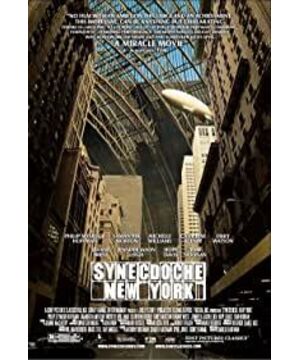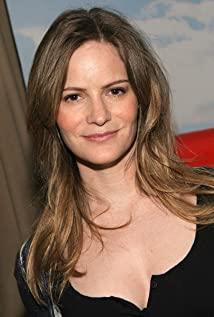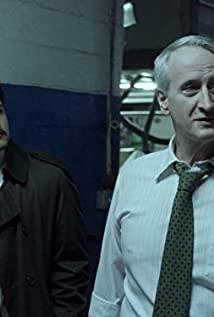Charlie Kaufman became famous in 1999 with the original script "Puppet Life". After entering the millennium, he worked tirelessly to create several imaginative scripts: "Human Nature", "Adapted Screenplay" , "Eternal Sunshine of a Beautiful Mind", which made Spike Jones and Michel Gondry, the two most sought-after MV directors in the small circle, quickly became known to the general audience. Kaufman's script is peculiarly conceived, full of unrestrained fantasy and absurd and uninhibited characters, and the plot development is also unpredictable, and naturally won the reputation of a ghost screenwriter. Kaufman, who has been making wedding dresses for others for many years, finally directed his directorial debut "New York Synonymy" in 2008, and was shortlisted for the competition unit of the Cannes Film Festival that year. Although it eventually returned empty-handed, this debut film conquered many audiences and became the top ten film of the year by American chief film critic Roger Ebert.
Kaufman is very discerning in selecting actors. Needless to say, Oscar winner Philip Seymour Hoffman , and several powerful actresses in the film won my heart even more, Katherine Keener, Michelle William James, Jennifer Jason Leigh, three familiar faces in American indie films, gave brilliant performances in the film, and the most satisfying thing for me is to see Samantha Morton and Emily · Watson on the same stage. These two are British actresses that I admired very much back then, because they both dared to challenge extremely difficult roles, although they did not have such a chance to play in this film, nudity and sex scenes are really side dishes for them both a plate of.
The film revolves around the life and work of a theater director, spanning from middle age to old age. His marriage with his wife went into trouble, and his divorced wife took her daughter to Germany to continue her artistic creation. He stayed alone in New York, had emotional entanglements with several women around him, and then obtained a sum of money to realize his huge artistic dream. It may be difficult to summarize the wonders of this middle-aged male emotional theme in a few simple sentences, only because of its high-density narrative time, dreamy logic and realistic sense of theater , people suddenly feel a sense of loss during the viewing process. Dizziness, or a sudden realization.
On the surface, this appears to be ordinary daily life, but in fact the narrative is like a wild horse, breaking free from the laws of physical time . Attentive audiences may wish to note that in less than ten minutes at the beginning, it is about events that spanned more than a month. The daughter's growth process is even more staggering: from home at the age of four, to follow her mother to Germany at the age of 11, and then to appear in a porn club at the age of 30 with full body tattoos. When the audience wakes up, they have found her dying on the sickbed and condemned her father for his actions. Don't ask yourself. What's even more strange is that this huge project of miniaturizing New York has been in progress for many years, but the actors on the scene began to complain, why did the rehearsal take so long but no audience came to watch?
This highly compressed time method has become a unique style of Kaufman, which not only hides the process of time passing, but also omits many key details, allowing the audience to quickly make up for it in the high-density narrative plot. details, thus giving people a sense of dizziness. Secondly, how much money did the actor get to continue this crazy art project endlessly? There is no explanation from the beginning to the end of the film. But this increasingly large-scale miniature city is not a fantasy imagined by the hero. This is due to the unique brain hole of the genius screenwriter Kaufman. As long as you accept this "dream logic", the other, more outlandish details (the house on fire, the ex-wife's miniature painting in the art gallery, etc.) won't be a hindrance to viewing the movie.
The sound of the word "synecdoche" in the title is similar to the name of the eastern New York city called Schenectady, where the miniature version of New York is located. The rhetorical device of synonymy replaces the whole with the part, or vice versa. The bizarre title has a pun intended, referring to the film's director of theater who recreates an almost-real-world New York City to refer to the entire human world. The theater director built this increasingly large theater, providing actors with an unimaginably vast space for rehearsal and performance. Under the shroud of this artificial theater feeling, the boundary between the real life of the hero and the fictional plot of the drama gradually becomes blurred. When he finds actors to play himself and his lover later, this ambiguous experience reached the peak.
However, judging from the plot in the second half of the story, the narrative trick of confusing truth and falsehood is not Kaufman's main purpose . What he cares more about is to convey the helpless sigh of life by depicting the dramatist's life. This is a story that happened to a theater director, but it has a fairly general meaning when you look closely, and it can happen to each of us: love, marriage, child growth, divorce, child rebellion, career failure, illness, loneliness, Aging...Life is always full of endless disappointments, and the inescapable end point is death. Not only life is like this, but art is also the same, and it cannot escape the fate of demise. In the last scene, the entire miniature city is dilapidated and the actors have died one after another. This is the most blatant hint.
It's a fantasy story, but it also feels like a sweet one. Of course, it is undoubtedly a deeply sad story by its very nature. Kaufman is good at telling tragedies in a humorous tone, depicting loners and losers with glorious brushwork . Although its endings invariably end in death (as does this year's new work "I Want to End It All"), it lacks the tear-jerking appeal of common tragic themes, often in an elusive emotional atmosphere. Let the audience follow the protagonist to experience the ups and downs of his life experience, in order to achieve the ultimate goal of empathy. Kaufman's three films to date are all more or less fatalistic , but overshadowed by their highly stylized scripts and deeply bewildering narrative techniques. This makes his work seem like he is constantly unpacking a well-wrapped and beautifully designed gift box, only to find that there is nothing but a withered and faded flower inside.
View more about Synecdoche, New York reviews











